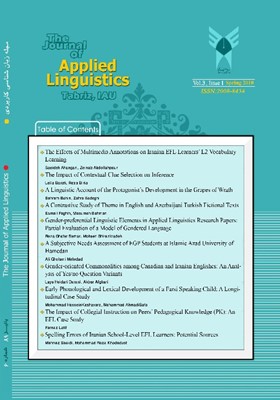The Impact of Collegial Instruction on Peers’ Pedagogical Knowledge (PK): An EFL Case Study
الموضوعات : آموزش زبان انگلیسی
1 - Department of English, Khourasgan Branch, Islamic Azad
University, Khourasgan, Iran.
الکلمات المفتاحية: Professional Development, Collegial Teaching, Pedagogical Knowledge, Collegial Professional Development, Peer-Based Learning,
ملخص المقالة :
Shared responsibilities such as mentoring, instruction, learner monitoring and classroom management enable the peers to observe, review, reflect on and learn from the overall practical professional expertise of one another through collegial instruction experience. The present exploratory case study has The present exploratory case study has attempted to study collegial teaching as an innovative instruction model (as an alternative to solo-based instruction models) in a General Business English course in SAPco (An automotive part supplier in Iran). To this end, the researcher has mainly tried to concentrate on two expert business English teachers' perceptions concerning their experience of collegial teaching for business English courses, observing their reflections before and after the course, to focus on the possible impacts of this type of instruction on their pedagogical knowledge as language teacher. As a result, as it is indicated in overall reflections of the participant colleagues, collegial instruction is believed to lead toward a more efficient transferability and development of teachers' pedagogical knowledge than what can take place as a result of individually run traditional practices. Moreover, this type of instruction can be a rather cost-effective and timesaving alternative to traditional OJT (on the job training) courses for teacher development authorities and curriculum developers who are concerned about and willing to promote professional development of their teachers.
Attardo, S. & Brown, S. (2005). What’s the use of linguistics? Pre-service English teachers’ beliefs towards language use and variation. In N. Bartels (Ed.). Applied linguistics and language teacher education (pp. 91-102). New York: Springer.
Bailey, K. M. (1996). The best laid plans: teachers’ in class decisions to depart from their lesson plans. In K. M. Bailey,& D. Nunan (Eds.), Voices From the Language Classroom (pp. 15–40). Cambridge: Cambridge University Press.
Borg, S. (1999). Teachers’ theories in grammar teaching.ELT Journal, 53(3), 157-167.
Borg, S. (1999a). Studying teacher cognition in second language grammar teaching. System, 27(1), 19−31.
Borg, S. (1999b). Teacher cognition in second language grammar teaching. Unpublished Ph. D. thesis, University of Exeter, Exeter, UK.
Borg, S. (1999c). Teachers’ theories in grammar teaching.ELT Journal, 53(3), 157−67.
Borg, S. (1999d). The use of grammatical terminology in the second language classroom: A qualitative study of teachers’ practices and cognitions. Applied Linguistics, 20(1), 95−126.
Borg, S. (2005b). Experience, knowledge about language, and classroom practice in teaching grammar. In N. Bartels (Ed.).Applied Linguistics and Language Teacher education (pp. 325-40). New York: Springer.
Clandinin, D. J., & Connelly, F. M. (1986). Rhythms in teaching: the narrative studyof teachers' personal practical knowledge of classrooms. Teaching & Teacher Education, 2(4), 377-387.
Fenstermacher, G. D. (1994). The knowledge and the known: The nature of knowledge in research on teaching. In L. Darling-Hammond (Ed.), Review of research in education (pp. 3-56). Washington: American Educational Research Association.
Golombek, P. R. (1998). A study of language teachers’ personal practical knowledge. TESOL Quarterly, 32(3), 447−64.
Grossman, P. (1990). The making of a teacher: Teacher knowledge and teacher education. New York: Teachers' College.
Grossman, P. (1995). Teachers' knowledge. In L. W. Anderson (Ed.), International encyclopedia of teaching and teacher education (pp. 20-24). New York: Pergamon.
Kennedy, M. M. (1999). Ed schools and the problem of knowledge. In J. D. Raths, & A. C. McAninch (Eds.), What counts as knowledge in teacher education? (pp. 29-45). Stamford: Ablex Publishing Corporation.
Lortie, D. (1975). Schoolteacher: A Sociological Study. Chicago: University of Chicago Press.
Marland, P. (2001). Teachers' practical theories: Implications for teacher development. In Y. C. Cheng, M. M. V. Mok, & K. T. Tsui (Eds.), Teaching effectiveness and teacher development: Towards a new knowledge base (pp. 165-182). Hong Kong: The Hong Kong Institute of Education.
Shimahara, N. K. (1998). The Japanese model of professional development: Teaching as craft. Teaching & Teacher Education, 14(5), 451-462.
Tamir, P. (1991). Professional and personal knowledge of teachers and teacher educators. Teaching & Teacher Education, 7(3), 263-268.
Tsui, A. B. M. (1996). Learning how to teach ESL writing. In D. Freeman, & J. C. Richards (Eds.). Teacher learning in language teaching (pp. 97-119). Cambridge: Cambridge University Press.
Tsui, A. B. M., & Nicholson, S. (1999). Hypermedia database and ESL teacher knowledge enrichment. Journal of Information Technology for Teacher Education, 8(2), 215-237.


